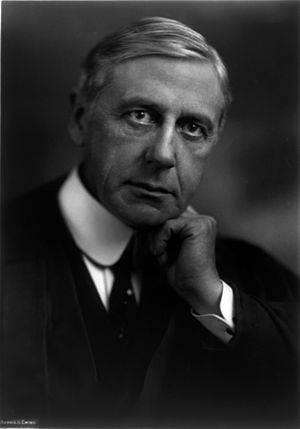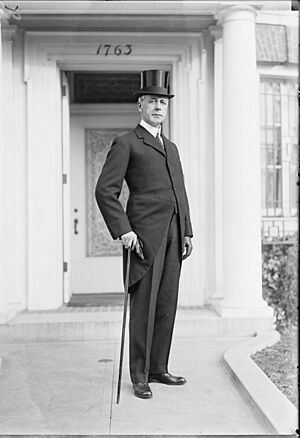Mahlon Pitney facts for kids
Quick facts for kids
Mahlon Pitney
|
|
|---|---|
 |
|
| Associate Justice of the Supreme Court of the United States | |
| In office March 18, 1912 – December 31, 1922 |
|
| Nominated by | William Taft |
| Preceded by | John Marshall Harlan |
| Succeeded by | Edward Terry Sanford |
| Member of the U.S. House of Representatives from New Jersey's 4th district |
|
| In office March 4, 1895 – January 10, 1899 |
|
| Preceded by | Johnston Cornish |
| Succeeded by | Joshua Salmon |
| Personal details | |
| Born | February 5, 1858 Morristown, New Jersey, U.S. |
| Died | December 9, 1924 (aged 66) Washington, D.C. |
| Political party | Republican |
| Spouse |
Florence Shelton
(m. 1891) |
| Children | 3 |
| Education | Princeton University (AB) |
Mahlon Pitney (born February 5, 1858 – died December 9, 1924) was an important American lawyer, judge, and politician. He served in the U.S. House of Representatives for two terms. Later, he became an associate justice of the U.S. Supreme Court. He held this high position from 1912 to 1922.
Contents
Early Life and Education
Mahlon Pitney was born in Morristown, New Jersey. His family had been in New Jersey since 1720. His great-grandfather, also named Mahlon Pitney, fought in the American Revolutionary War alongside George Washington.
Mahlon Pitney went to the College of New Jersey, which is now called Princeton University. He was in the same class as Woodrow Wilson, who later became a U.S. President. Pitney was also the manager of the school's baseball team.
After graduating in 1879, he studied law with his father. He passed his law exam in 1882 and started his own law practice. In 1889, he took over his father's law firm.
Pitney married Florence Shelton in 1891. They had three children. Both of their sons also went to Princeton and became lawyers. Mahlon Pitney was also the great-grandfather of the famous actor Christopher Reeve.
A Career in Politics
In 1894, Pitney decided to run for the United States House of Representatives. He won the election and served two terms, from 1895 to 1899. He represented New Jersey's 4th congressional district.
Pitney was a rising star in New Jersey politics. He wanted to become the state's governor. To gain more local support, he left the U.S. House before his second term ended. He then ran for and won a seat in the New Jersey Senate in 1889.
In the state legislature, he became a leader for his party. He helped the Republicans gain control of the Senate after the 1900 election. Later, he became the Senate President.
Becoming a Judge
Even though Pitney wanted to be governor, the current governor, Foster M. Voorhees, supported someone else. In 1901, Governor Voorhees offered Pitney a seat on the New Jersey Supreme Court. This move helped keep the political party united.
Seven years later, Pitney was promoted to Chancellor of New Jersey. This was a special judicial role under the state's old constitution.
On the Supreme Court
On February 19, 1912, President William Howard Taft nominated Mahlon Pitney to be an Associate Justice of the Supreme Court of the United States. The U.S. Senate approved his nomination on March 13, 1912. He officially started his new role on March 18, 1912.
Some people, especially those who supported progressive ideas, were against his nomination. This was partly because of a decision he made as chancellor. In that case, Jones Glass Co. v. Glass Bottle Blowers Association, he limited how much unions could stop companies from using replacement workers during strikes.
During his time on the Supreme Court, Pitney was known for his conservative views. He believed in a legal idea called substantive due process. This idea means that courts can protect certain rights even if they are not directly written in the Constitution.
For example, in the case of Coppage v. Kansas, Pitney wrote the main opinion. The Court ruled that a Kansas law banning "yellow-dog contracts" was unconstitutional. These contracts made workers promise not to join a union. The Court said the government couldn't use its power to make bargaining power equal between companies and workers.
Even though he was cautious about unions, Pitney also worried about businesses growing too powerful. He supported using the Sherman Antitrust Act more broadly. This law helps prevent monopolies and unfair business practices.
Justice Pitney also wrote the main opinion in New York Central Railroad Co. v. White. In this case, the Court supported a New York law that provided workers' compensation. This decision helped expand similar programs across the country. He also wrote the opinion in the controversial case of Frank v. Mangum. This case upheld a murder conviction from 1915.
Pitney resigned from the Supreme Court in 1922 because he had a stroke. He was one of only two Supreme Court Justices nominated by President Taft who also served while Taft was Chief Justice.
Death and Legacy
Mahlon Pitney passed away in 1924 in Washington, D.C.. He was buried in Evergreen Cemetery in Morristown, New Jersey.
A legal scholar named Richard Epstein once called Justice Pitney "a great justice." He said Pitney did a lot to protect important constitutional values.
 | James Van Der Zee |
 | Alma Thomas |
 | Ellis Wilson |
 | Margaret Taylor-Burroughs |


